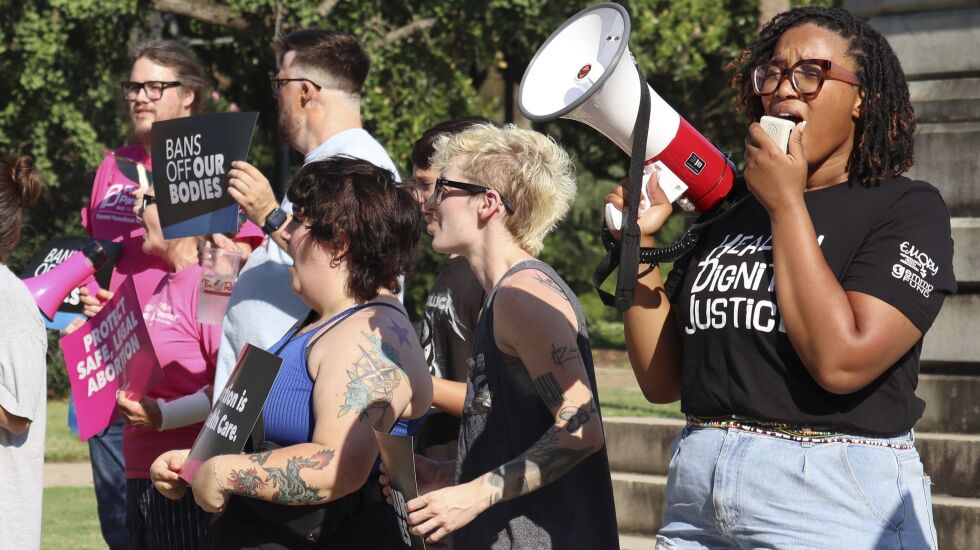
Indiana’s recent near-total abortion ban is certain to add to the influx of girls and women traveling to our state since the U.S. Supreme Court overturned Roe v. Wade last year, stripping away the constitutional right to abortion.
But even when abortion is restricted or outlawed in places much further away, the domino effect will continue to strike hard in Illinois and other states where the procedure remains legal, according to local abortion rights activists.
Now, advocates are bracing for the worst in Florida, where the state Supreme Court is considering upholding a 15-week abortion ban.
There is no time for complacency. Everyone who cares about a woman’s right to make her own decisions about pregnancy must continue to stand up for those rights, just as our Gov. J.B. Pritzker and other pro-choice elected lawmakers have done.
Efforts to ensure Illinois remains “an island of reproductive justice” continue, from the passage of sweeping legislation expanding abortion access to the launch of a hot line that helps patients schedule reproductive services at hospitals across the state.
Still, as demand intensifies, there is concern that women seeking assistance with obtaining an abortion could eventually be marooned.
‘Not sure how long it will be sustainable’
Consider the latest statistics released by the Guttmacher Institute last week: Within the first six months of this year, there were 44,690 documented abortions in Illinois. That’s a nearly 70% increase from the 26,390 procedures recorded during the same period three years before. Nationwide, as might be expected since Roe was overturned, more women are traveling to obtain abortions and other states are seeing similar increases, the Guttmacher data show.
In Illinois, that means more resources and financial support for low-income women, including those from out of state who are seeking abortions, will be needed.
No one has been turned away from services provided at the Chicago Abortion Fund since 2019, but that could change as the numbers skyrocket, the nonprofit’s Executive Director Megan Jeyifo told us.
“We’re not sure how long it’ll be sustainable,” Jeyifo said, adding that staffers at the organization, which receives funding from the city and donors, have been “overwhelmed and exhausted” following the Supreme Court’s decision in Dobbs v. Jackson Women’s Health Organization.
There was an outpouring of donations to abortion funds following the ruling, but the money — used to cover out-of-pocket costs for the procedure, travel expenses, hotel stays and child care — is drying up fast, Oriaku Njoku, the executive director of the National Network of Abortion Funds, told The Chronicle of Philanthropy in June.
Now, there’s a “mismatch where the need is increasing, but the amount of support that’s coming in has not balanced out,” said Njoku. The network has nearly 100 members, including Chicago Abortion Fund.
Planned Parenthood of Illinois has been able to comfortably tend to its escalating clientele and should be able to keep doing so in the near future, mostly due to the prominent organization’s years-long preparedness for the rollback of abortion rights.
Yet even with its solid foundation, the nonprofit, like other abortion providers, is continually assessing ways it can keep addressing the surge, said Kristen Schultz, chief strategy and operations officer with Planned Parenthood of Illinois.
Sharing time and personal stories
Illinoisans who want to keep the abortion access ball rolling along can contribute by donating to Chicago Abortion Fund, Planned Parenthood of Illinois or other clinics.
Volunteering can also go a long way, said Schultz. Since the Dobbs decision, there were almost 700 new volunteer sign-ups at Planned Parenthood of Illinois compared to 250 the year before. Additionally, 850 volunteers registered for events within the last year, compared to only 250 registered volunteers the year prior.
Another way to help is for women, and men, to share their experiences to alleviate the stigma surrounding abortion. It isn’t always an easy ask. Publicly airing abortion tales can be empowering and rewarding but it also opens the storyteller to harassment and threats, according to a 2020 exploratory study by the University of California, San Francisco.
The latest abortion data also tells a narrative: Illinois has kept its promise to uphold the belief that abortion is part of health care, and that access to it gives pregnant girls and women the power to make decisions about their own bodies.
When other states fail to do the same, Illinois can, and must, keep the torch lit.
The Sun-Times welcomes letters to the editor and op-eds. See our guidelines.







